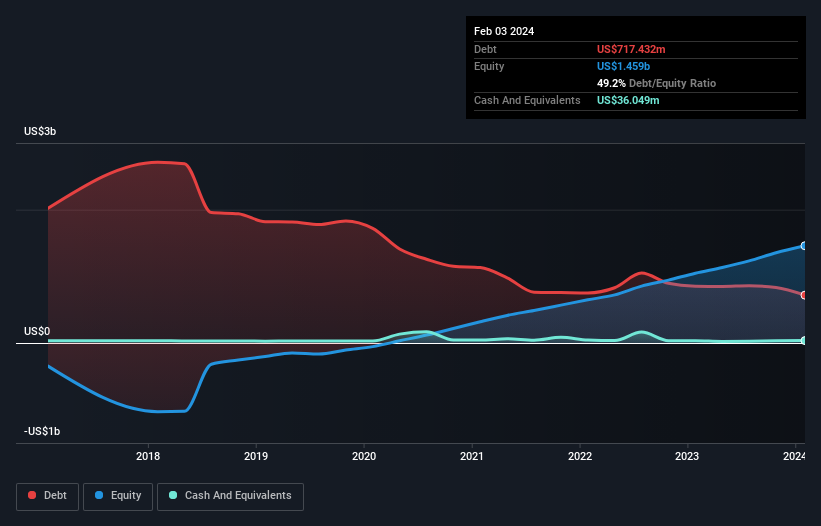- United States
- /
- Food and Staples Retail
- /
- NYSE:BJ
We Think BJ's Wholesale Club Holdings (NYSE:BJ) Can Stay On Top Of Its Debt

Warren Buffett famously said, 'Volatility is far from synonymous with risk.' When we think about how risky a company is, we always like to look at its use of debt, since debt overload can lead to ruin. We can see that BJ's Wholesale Club Holdings, Inc. (NYSE:BJ) does use debt in its business. But the real question is whether this debt is making the company risky.
When Is Debt A Problem?
Generally speaking, debt only becomes a real problem when a company can't easily pay it off, either by raising capital or with its own cash flow. If things get really bad, the lenders can take control of the business. However, a more usual (but still expensive) situation is where a company must dilute shareholders at a cheap share price simply to get debt under control. Of course, the upside of debt is that it often represents cheap capital, especially when it replaces dilution in a company with the ability to reinvest at high rates of return. The first thing to do when considering how much debt a business uses is to look at its cash and debt together.
View our latest analysis for BJ's Wholesale Club Holdings
What Is BJ's Wholesale Club Holdings's Debt?
You can click the graphic below for the historical numbers, but it shows that BJ's Wholesale Club Holdings had US$717.4m of debt in February 2024, down from US$852.9m, one year before. However, it does have US$36.0m in cash offsetting this, leading to net debt of about US$681.4m.

A Look At BJ's Wholesale Club Holdings' Liabilities
Zooming in on the latest balance sheet data, we can see that BJ's Wholesale Club Holdings had liabilities of US$2.47b due within 12 months and liabilities of US$2.75b due beyond that. On the other hand, it had cash of US$36.0m and US$234.8m worth of receivables due within a year. So its liabilities outweigh the sum of its cash and (near-term) receivables by US$4.95b.
BJ's Wholesale Club Holdings has a very large market capitalization of US$10.3b, so it could very likely raise cash to ameliorate its balance sheet, if the need arose. But it's clear that we should definitely closely examine whether it can manage its debt without dilution.
We use two main ratios to inform us about debt levels relative to earnings. The first is net debt divided by earnings before interest, tax, depreciation, and amortization (EBITDA), while the second is how many times its earnings before interest and tax (EBIT) covers its interest expense (or its interest cover, for short). This way, we consider both the absolute quantum of the debt, as well as the interest rates paid on it.
BJ's Wholesale Club Holdings's net debt is only 0.66 times its EBITDA. And its EBIT covers its interest expense a whopping 12.6 times over. So you could argue it is no more threatened by its debt than an elephant is by a mouse. The good news is that BJ's Wholesale Club Holdings has increased its EBIT by 6.4% over twelve months, which should ease any concerns about debt repayment. The balance sheet is clearly the area to focus on when you are analysing debt. But ultimately the future profitability of the business will decide if BJ's Wholesale Club Holdings can strengthen its balance sheet over time. So if you want to see what the professionals think, you might find this free report on analyst profit forecasts to be interesting.
Finally, while the tax-man may adore accounting profits, lenders only accept cold hard cash. So the logical step is to look at the proportion of that EBIT that is matched by actual free cash flow. During the last three years, BJ's Wholesale Club Holdings produced sturdy free cash flow equating to 52% of its EBIT, about what we'd expect. This cold hard cash means it can reduce its debt when it wants to.
Our View
When it comes to the balance sheet, the standout positive for BJ's Wholesale Club Holdings was the fact that it seems able to cover its interest expense with its EBIT confidently. But the other factors we noted above weren't so encouraging. For instance it seems like it has to struggle a bit to handle its total liabilities. When we consider all the elements mentioned above, it seems to us that BJ's Wholesale Club Holdings is managing its debt quite well. But a word of caution: we think debt levels are high enough to justify ongoing monitoring. There's no doubt that we learn most about debt from the balance sheet. But ultimately, every company can contain risks that exist outside of the balance sheet. For example, we've discovered 2 warning signs for BJ's Wholesale Club Holdings that you should be aware of before investing here.
Of course, if you're the type of investor who prefers buying stocks without the burden of debt, then don't hesitate to discover our exclusive list of net cash growth stocks, today.
Valuation is complex, but we're here to simplify it.
Discover if BJ's Wholesale Club Holdings might be undervalued or overvalued with our detailed analysis, featuring fair value estimates, potential risks, dividends, insider trades, and its financial condition.
Access Free AnalysisHave feedback on this article? Concerned about the content? Get in touch with us directly. Alternatively, email editorial-team (at) simplywallst.com.
This article by Simply Wall St is general in nature. We provide commentary based on historical data and analyst forecasts only using an unbiased methodology and our articles are not intended to be financial advice. It does not constitute a recommendation to buy or sell any stock, and does not take account of your objectives, or your financial situation. We aim to bring you long-term focused analysis driven by fundamental data. Note that our analysis may not factor in the latest price-sensitive company announcements or qualitative material. Simply Wall St has no position in any stocks mentioned.
About NYSE:BJ
BJ's Wholesale Club Holdings
Operates warehouse clubs on the eastern half of the United States.
Good value with proven track record.

